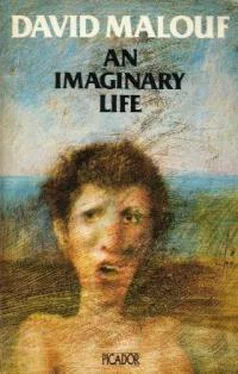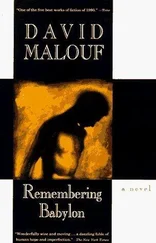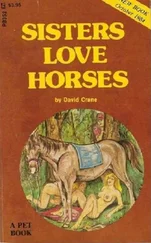But miraculously the fifth night passes, and the boy survives. As morning comes I hear the old woman make little clucking sounds, talking to the boy as if he could hear at last and shaking Ryzak out of the half-sleep he has fallen into, his head dropped forward, though his body, as he squats, is perfectly upright. The boy’s mother rises slowly to her feet, out of the place against the wall where for five days now she has been sunk in abject seclusion. Ryzak clasps his hands and utters big shouts of boisterous relief, teasing the boy, I guess, for giving them all so much worry, and he immediately comes to the middle of the room, grinning, and waves his hand at me. All his fear and resentment have vanished. He crosses to the window and lifts the bar. Bright light floods the room. It is one of those clear white days when the whole countryside is visible, glittering white under a sky of cloudless blue, and the sudden rush of cold air into the room is extraordinary. Ryzak stretches, utters another huge shout as he holds his arms wide out to the sky, and then, staggering back into the room, rolls into the pile of rushes that is his bed and immediately falls into the first real sleep he has known for nearly a week. The boy’s mother also sleeps, stretched out on the floor at his side. Only the old woman, who is tireless, continues to crow over the child, offering him tidbits from a plate, occasionally laughing to herself, even once or twice calling across to me, though what she is saying in her toothlessness I can never tell. The danger is past. We have come through. Suddenly I remember how tired I am. A great wave comes over me, and without even crawling the three feet to my bed of rushes, I allow myself to sink back under the flood of light from the window and sleep.
We are already past the worst of it. The winter solstice ahs long since come and gone, the dark of the year’s deepest place has been entered and the limit touched, the earth swings away towards the light again, and I feel my own spirits lifted as the days begin to lengthen. More and more often now periods of still bright weather open the whole country to our view, the sea glitters, the first birds return, the ice of the river on still nights can be heard grinding in the dark.
We can even begin at last to move about the house. I go down with the Child to the byre and we sit there with the animals, hearing them snuffle and snort in the half-dark, shifting, chewing, dropping the steaming heaps of dung that give the place its acrid odor, which seems almost pleasant after the stale air of the upper room, feeling their warmth as they crowd together in their stalls. They begin to be restless, scenting the spring. In two or three weeks now, when the ice has been cleared away, they will be led out into the fields again. Each day men are at work, chopping corridors through the ice, digging away the feet of frozen snow that block the narrow lanes between the huts, clearing yards to make outhouses accessible again. Even my own little house begins to reappear above the level of the snow. Soon we will be able to move back there, the Child and I, and our old life will resume. Then in a month or so we will return to our island in the swamp, to the birds, the moths, the new spring caterpillars, the vowels and consonants the Child has almost forgotten, it is so long since we rehearsed them; though now that he has spoken a word at last I know they are still to be found there at the bottom of his mind, that in some secret part of his being, deeper even than sleep, he has begun to speak to himself, and will eventually speak to me. We go down each day to the byre because the room itself has become intolerable. We exist there only on sufferance. Only because Ryzak is responsible for me.
His power over the household has been deeply shaken by the events of the last weeks. It is the old woman who rules. It was her magic that saved the boy’s life - this is what she tells him - and his foolish trust, and the young woman’s pity, that exposed them all to destruction. The boy is, after all, his only grandson. When he watches him no it is with a quickened sense of how vulnerable the child is, how vulnerable he is, to extinction, and with some realization also of how little his strength of arms can do, and did do, at the moment of crisis. It is as if the old woman had found a way at last of poisoning his spirit, of stealing back the male strength she once gave him and which all these years has been the source of his ascendancy over her. There are moments when he seems almost like a child in her presence. One recognizes in the old woman’s face real hostility, a new sense of triumph. The house is filled with the glow of her magic, the smell of her herbs, her potions and the endless doddering syllables of her prayers.
At the first full moon she will sacrifice in the women’s grove outside the village, in thanksgiving for the boy’s life. Ryzak goes out alone to bring back the victim, a wild puppy, whose entrails will be burned on an altar of turf and offered up to the triple Hecate. The boy begs to go with him but is refused. The puppy will be taken from among the wild dogs, part mongrel, part wolf, that roams in packs through the undergrowth beyond the village and are, on occasion, since they are also sacred, fed scraps from the parapets. Lean, gray-black creatures, all ribs, they fight, tumbling in heaps over their strips of meat and rancid fat, then slink into the brush. Ryzak returns with the puppy in a little wicker basket, and for ten days, until the full moon, it whimpers in a corner of the room, and is a source of real agony to the Child. Waking in the dark, to hear the soft crying, I have thought it was the Child himself, and finding him crouched over the basket in the dark, answering the animal’s cries with little high-pitched whinings of his own, have had the greatest difficulty drawing him back to his pallet. And all the time I was aware of the old woman, sitting bolt upright in her corner, watching, and have imagined her invisible smile.
Does the Child know what is intended? Has she had the small creature brought here deliberately, and early, to establish this communication between them, the Child and her animal victim? Is the ceremony she is preparing less an offering of thanks for the life of the boy than an exorcism of the Child? As the time approaches the Child becomes more and more agitated and I fear he may relapse into his fever. The merest sound from the puppy sets him trembling now, and if I restrain him from going to the basket he will answer the creature from a distance, reproducing absolutely the whole range and pitch of its whinings, and the old woman laughs outright, her savage, crow like caw. Does the animal sense what is to occur? Does he communicate it to the Child? Or is it simply the presence in the room at last of some kindred spirit, something other than our human presence, that disturbs him? Or some new realization, in the animal’s distress, of his own loss of freedom? Or is it, night after night, the growing brightness of the moon? For nearly a week now the weather has been clear, and we sleep with the windows unbarred and the moon’s light upon the room, picking out its familiar objects with a ghostly blueness, which is the moonlight striking off snow, and making thick, almost palpable shadows.
At last the night arrives. The two women go out just after the rising of the moon, taking the boy, and Ryzak carries the basket as far as the courtyard gate, then climbs the ladder again and suggests one of our games with the tablet and pegs. From the window I watch the old woman’s party pass along the narrow lane, gathering adherents as it goes. All the women of the village will assemble at last in the grove. No man is permitted to see their rites. These are the offices of the moon, and belong to the world of women’s power and women’s worship, that are older, more mysterious, than the world of men. Ryzak, as we play, seems oddly ill at ease and I actually win a game. When the women come back they are silent, still wrapped in whatever power it is that the moon has over them, plucking as it does monthly at the tides of their bodies, swelling in them, waning, brooding over the darkness and transmuting all those things that we know by daylight in its softer, vaguer light. Almost immediately, without speaking, Ryzak retires to his pallet. Their silence oppresses him. The Child, who has made no move since the puppy was taken from the room, sits hunched in his corner, deep in one of his body trances, and refuses to sleep. I am aware all night of a strangeness that is upon us, a change, that may be simply the full moon, but seems rather to emanate from the Child’s dreamlike wakefulness, or the old woman’s, since all night she sits with her eyes wide open, unseeing, and the moon full upon her, taking its power deep into her and uttering, occasionally, great sighs, as if some stronger creature were breathing regularly through her.
Читать дальше












